YOUMIG - Study visits: Burgas to Vienna
29-12-2017
In search of Bulgarian diaspora - A lot of young people from YOUMIG partner municipality Burgas are leaving towards Western Europe and the city of Vienna is one of their target cities. Different working and educational opportunities are available there, but also the German language seems to be an important attraction point, since many young Bulgarians are studying German already in high school. The Goethe Gymnasium in Burgas offers language education on a very high level and there are other widely-recognised German-language high schools in Sofia and Lovech.
During November 2017, Vesselina Dimitrova and Margarita Valcheva, two representatives of the municipality of Burgas, made their way to Vienna to learn about the arrival and integration of migrants to the city, the organisation of the Bulgarian Diaspora and to hear about the challenges of migration, potentials for return and transnational perspectives on the new and the old home.
The Bulgarian Community in Vienna
Bulgarian migrants to Vienna can generally be divided into two types: the highly-educated and qualified people on the one hand, and the low-qualified labour force with basic literacy problems on the other. The high-qualified Bulgarians are well integrated and are organising the Bulgarian community in Vienna. The Bulgarian Cultural Institute here has the role of being a place where Bulgarians can gather and watch Bulgarian theatre or exhibitions. Other structures targeting the Bulgarian community are the Bulgarian electronic media (newspapers, blogs, television, but also social media e.g. “Die Bulgaren in Wien”/”Die Bulgaren in Österreich” on Facebook) and various clubs and dancing ensembles, but also the Bulgarian church and the Bulgarian school. Most of the representatives of the Diaspora expressed the view that Vienna is their home and they would not return to Bulgaria. There was no interaction with the lower-qualified group of people during this visit, but the general opinion was that this group works seasonally in Vienna or commutes between Vienna and Bulgaria on a monthly basis. There is less interest or potential among them to integrate into the society (e.g. due to a missing language knowledge), but rather they have interest in target earning.
According to data from the Austrian statistical office, in 2017 there were officially around 25,000 Bulgarian nationals registered in Austria. The majority lives in Vienna (ca. 16,000). The number of Bulgarian citizens living in Austria has been rising for many years (by about 2,500 people from 2016 to 2017).
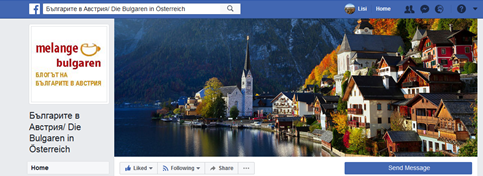
The Facebook page “Melange Bulgaren – Die Bulgaren in Wien”, where different forms of communication take place (job offers/searches, search for accommodation, advertisement of cultural events, ect.
The Department of Diversity and Integration (MA 17) – how migration is managed in Vienna
Since 2005, Vienna has developed a Department for Diversity and Integration into its city administration (as the “Magistratsabeilung” number 17). The Department implements various programmes to help immigrants for their better and faster integration. From its approach it is people-orientated and provides support to incoming migrants even in their mother tongue. Good practices were introduced by Alejandro Pena – an inspiring employee of the Department who is always ready to help. For Bulgarian immigrants for example the programme “Start Wien” can be mentioned as important, where also migrants from other EU countries are introduced to different topics (e.g. education, housing, labour market or culture) and offered financial support for language courses. Other programmes offer help in entrepreneurship or education and cooperate with other departments on the topic of diversity. The department also monitors diversity and integration in different studies. Just recently the “Integration Monitor” was published, which observes the development of the city according to immigration and its effects.


Martina Schorn, Adam Nemeth, Margerita Valcheva and Vesselina Dimitrova listening to the presentation of Alejandro Pena from the MA 17
The Bulgarian Church
It was only in early 2017 that the Bulgarian community was able to see a new church built in the city of Vienna. The new location of the Bulgarian Orthodox church was quite unexpected – hidden on the ground level of a newly-build residential building, still boasting a magnificent chapel with an impressive interior. The priest was very happy to have a new church where all orthodox Christians from Bulgaria can find a point of attraction and place for spiritual support. He said he had contact with 1600 Bulgarian families in Vienna and the visitors of the church were not only from high-income groups. The church does not get any funding from the city of Vienna, but is sponsored mainly from donations, which means a lot of financial difficulties. According to the priest, other churches are supported by the city or the state and he sees discrimination due to the small size of their community.
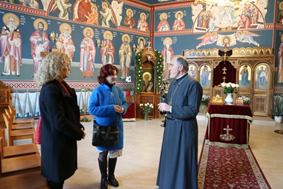
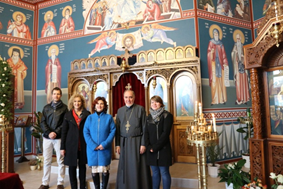
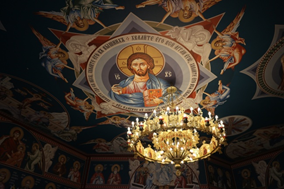

The Bulgarian School
The Bulgarian community is also active in the bilingual and multicultural education of their children, which is why several Bulgarian schools exist within Austria. In the school in Vienna currently there are 309 Bulgarian children enrolled, many of them with parents originally from Burgas. The main aim of the school is that students have the opportunity to get a Bulgarian secondary education diploma. The school offers complimentary education with topics of geography, history, language and Bulgarian culture. It receives funding from the state of Bulgaria. The teacher of the Bulgarian school has a good overview of the community and follows the development of their pupils. The opinion was shared that Bulgarian students who finish their university studies abroad and do not start working there immediately, often return to Bulgaria. This does not include second-generation migrants, although such cases, even if rare, have happened in the last years.


Visit at the Bulgarian school
Bulgarians as International Students in Vienna
There are around 2000 students with Bulgarian citizenship studying in Vienna, ca. 600 of them study at the University of Vienna. The Bulgarian students are said to be a very integrated group of students, who don’t form groups among themselves but rather prefer to enter other communities. There might be two reasons for this – that foreign cultures are more interesting for Bulgarians or that Bulgarians are strong individualists, or maybe both. Therefore it was also difficult to get into contact with Bulgarian students during the exchange. Since the University of Vienna has a department for Slavic studies, where Bulgarian language is offered for some years, information about Bulgarian students could be sought here. A very small number of students study Bulgarian language in Vienna –13 persons in the year 2016. Most of them are students from Bulgaria or of Bulgarian descent who also study other subjects. A few study Bulgarian since because of a Bulgarian partner. According to Marchela Muradyan, lecturer for Bulgarian language at the department for Slavic Studies at the University of Vienna, when having studied in a foreign country, it is difficult to return, especially when having experienced a strong international flair in a city like Vienna. During the interviews it was mentioned that while Vienna has been the most attractive university city in the past years, at the moment a lot of young Bulgarians are aiming towards the Netherlands or the UK.
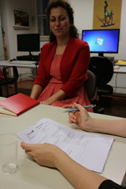
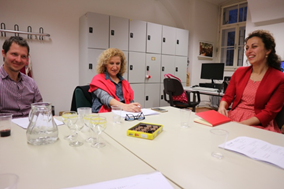
Sharing ideas and Bulgarian chocolate, and concluding the results of the Bulgarian Diaspora with Marchela Muradyan in the department for Slavic studies at the University of Vienna
Perspectives for transnational cooperation concerning youth migration
The study visit involved an exchange of ideas and made it possible to see developments in Bulgaria “from the other side”. For the representatives from Burgas, meeting and talking in person with the people who are “behind the desk” was interesting and inspiring: not least to get a better knowledge of the topic of migration and its motivations and effects. Also from an administrative point of view it was very interesting to get ideas and results from successful projects that could in the future be also implemented and “borrowed”. Since Burgas besides emigration of young people also experiences immigration (e.g. from Russia and Ukraine), also best practices concerning the immigration of migrants were of great interest. For the re-exchange therefore representatives of the diversity and integration department of the city of Vienna (MA 17) have been invited for further cooperation within the YOUMIG project.
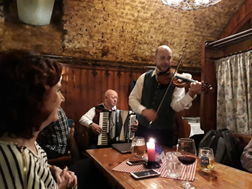

Also important during a study visit: cultural experiences. In front of “Stephansdom” - having dinner at the Esterhazykeller, where the musicians were happy to play Austrian, Bulgarian and Hungarian songs for us.
All photos by Elisabeth Gruber
